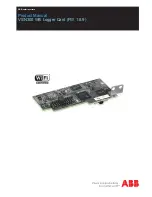
Section 7. Installation
107
7.3.1 ESD Protection
Related Topics:
• ESD Protection
(p. 107)
• Lightening Protection
(p. 108)
ESD (electrostatic discharge) can originate from several sources, the most
common and destructive being lightning strikes. Primary lightning strikes hit the
CR3000 or sensors directly. Secondary strikes induce a high voltage in power
lines or sensor wires.
The primary devices for protection against ESD are gas-discharge tubes (GDT).
All critical inputs and outputs on the CR3000 are protected with GDTs or
transient voltage suppression diodes. GDTs fire at 150 V to allow current to be
diverted to the earth ground lug. To be effective, the earth ground lug must be
properly connected to earth (chassis) ground. As shown in figure Schematic of
Grounds
(p. 108),
signal grounds and power grounds have independent paths to the
earth-ground lug.
Communication ports are another path for transients. You should provide
communication paths, such as telephone or short-haul modem lines, with spark-
gap protection. Spark-gap protection is usually an option with these products, so
request it when ordering. Spark gaps must be connected to either the earth ground
lug, the enclosure ground, or to the earth (chassis) ground.
A good earth (chassis) ground will minimize damage to the datalogger and
sensors by providing a low-resistance path around the system to a point of low
potential. Campbell Scientific recommends that all dataloggers be earth (chassis)
grounded. All components of the system (dataloggers, sensors, external power
supplies, mounts, housings, etc.) should be referenced to one common earth
(chassis) ground.
In the field, at a minimum, a proper earth ground will consist of a five foot
copper-sheathed grounding rod driven into the earth and connected to the large
brass ground lug on the wiring panel with a 14 AWG wire. In low-conductive
substrates, such as sand, very dry soil, ice, or rock, a single ground rod will
probably not provide an adequate earth ground. For these situations, search for
published literature on lightning protection or contact a qualified lightning-
protection consultant.
In vehicle applications, the earth ground lug should be firmly attached to the
vehicle chassis with 12 AWG wire or larger.
In laboratory applications, locating a stable earth ground is challenging, but still
necessary. In older buildings, new Vac receptacles on older Vac wiring may
indicate that a safety ground exists when, in fact, the socket is not grounded. If a
safety ground does exist, good practice dictates the verification that it carries no
current. If the integrity of the Vac power ground is in doubt, also ground the
system through the building plumbing, or use another verified connection to earth
ground.
Summary of Contents for CR3000 Micrologger
Page 2: ......
Page 3: ......
Page 4: ......
Page 6: ......
Page 30: ......
Page 34: ......
Page 36: ......
Page 96: ......
Page 485: ...Section 8 Operation 485 8 11 2 Data Display FIGURE 110 Keyboard and Display Displaying Data ...
Page 487: ...Section 8 Operation 487 FIGURE 112 CR1000KD Real Time Custom ...
Page 491: ...Section 8 Operation 491 FIGURE 116 Keyboard and Display File Edit ...
Page 496: ......
Page 502: ......
Page 564: ...Section 11 Glossary 564 FIGURE 126 Relationships of Accuracy Precision and Resolution ...
Page 566: ......
Page 594: ......
Page 598: ......
Page 600: ......
Page 602: ......
Page 624: ......
Page 642: ......
Page 643: ......
















































